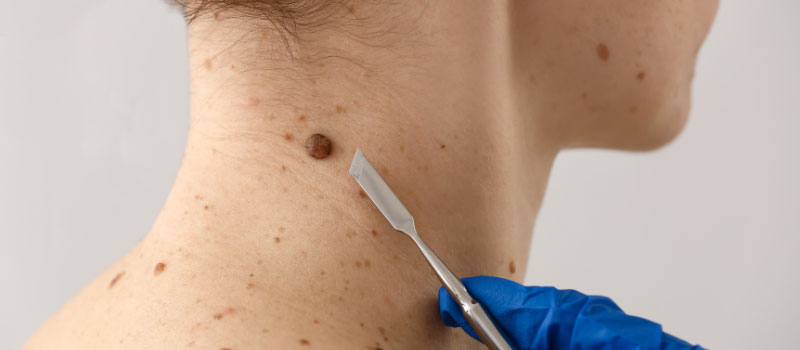Australia has some of the highest rates of skin cancer in the world. A skin cancer check by a trained doctor allows early detection of skin cancer, which may increase the chance of successful treatment.
Sydney’s beautiful Northern Beaches give us many opportunities to enjoy the outdoors – walks in the bush, days at the beach, hours out on the water.
It’s glorious! But it can be dangerous too.
The vast majority of skin cancers are caused by exposure to UV radiation in sunlight. That can happen even on overcast days. Though sunburn clearly damages skin, sun exposure that doesn’t lead to burning can also increase your risk of developing skin cancer.
To protect your skin, it’s important to slip on a shirt, slop on some SPF 30+ sunscreen, slap on a hat, seek shade and slide on some sunnies.
It’s also important to get a regular skin cancer check from a qualified doctor.
What’s involved in a skin cancer check?
A skin cancer check involves a doctor checking your body for signs of skin cancer using a dermascope, a hand-held tool a little like a microscope. This enables your doctor to examine your skin in great detail.
- Peace of mind
- Expertise
- Convenience
Types of skin cancer
Skin cancer refers to the uncontrolled growth of abnormal cells in the skin. There are three main types.
| Basal cell carcinoma | Squamous cell carcinoma | Melanoma |
|---|---|---|
| Most common – accounts for about 2 out of 3 skin cancers | About 1 out of 3 skin cancers | Rarest (only 1% of cases) but most dangerous as it’s the most likely to spread to other areas. |
| Grows slowly over months or years | Grows quickly over weeks or months | Some types grow very quickly, while others grow more slowly |
| If untreated, may grow deeper into the skin and damage nerves. | If untreated, may penetrate deeper skin layers and spread to other parts of the body. | If untreated, it may invade the deeper layers of skin and spread to other parts of the body. |
What exactly are we looking for? Signs of skin cancer
Your doctor will pay particular attention to the moles and spots on your skin.
| Concerning moles | Concerning spots |
|
|
If you see any changes in your skin, please visit a doctor. Most moles are harmless and there are many normal variations in skin so a change does not necessarily mean you have skin cancer. However, it is important to be sure, both for your own peace of mind and so that, just in case it is cancer, it can be treated promptly.
Meet Dr Jeff Cavanaugh
Dr Jeff Cavanagh is a GP with over 30 years of experience with qualifications in Advanced Skin Cancer Medicine.
Now semi-retired, he devotes his clinic hours exclusively to skin cancer, offering skin cancer checks, diagnosis and procedures.
Disclaimer
All information is general and not intended as a substitute for professional advice.
References
- Cancer Council, Causes of skin cancer, https://www.cancer.org.au/cancer-information/types-of-cancer/skin-cancer/causes-of-skin-cancer, [Accessed 18 March 2024]
- Skin Cancer End the Trend, Sun protection looks good on you, https://www.cancer.org.au/end-the-trend/sun-protection-looks-good-on-you/, [Accessed 18 March 2024]
- Cancer Council Victoria, Skin cancer, https://www.cancervic.org.au/cancer-information/types-of-cancer/skin_cancers_non_melanoma/skin-cancer-overview.html, [Accessed 18 March 2024]
- Cancer Council, Check for signs of skin cancer, https://www.cancer.org.au/cancer-information/causes-and-prevention/sun-safety/check-for-signs-of-skin-cancer, [Accessed 18 March 2024]



